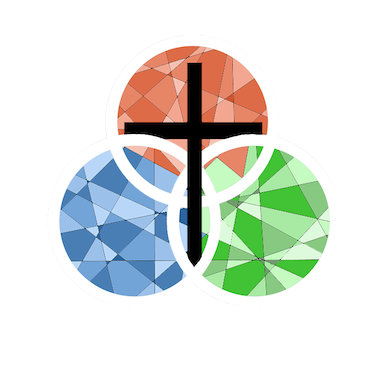(The following article was written in 1997. We've updated some terms and labels used in this article, to sound more inclusive)
Alice Vosburg called my attention to the posters which hung on the walls of the sanctuary of Bath United Church of Christ as we waited to hear Professor Marcus Borg lec¬ture about the politics and ethics of the Historical Jesus. The posters had been hung on Civil Rights Sunday (January 19th...the Sunday before Martin Luther King Day). The posters were designed to stimulate thought and reflection regarding the continued existence of racism in the church of Jesus Christ. These provoca¬tive posters caused me to ask the question "what kind of church is. Holy Trinity." I share them in the context of the church's Easter mission...the proclamation of the Good News of Christ's victory over darkness, despair and death to a hurting and lost world. In¬deed, what kind of church are we...
The panels in the sanctuary ad¬dress racism in the church. Read them and ask yourself where we are Then read them again and substitute other groups, e.g. women of all colors, disabled people, LGBTQ, poor people, old people...
An Excluding Church...
Enforces the racial status quo of dominance and exclusion of racial and ethnic people through its teachings, decision-making, pol¬icy, practices, and employment. Exclusion seen in absence of di¬versity of membership.
A Club Church...
Maintains the power of white advantage through teaching, deci¬sion-making, policy and practices. Tolerant of a limited number of racial and other peoples with "proper" credentials. Often heard: "We don't have a problem."
An Open Church...
Sees itself as committed to inclusion of all, but unaware of habits of privilege and paternalism. Symbolic inclusion, receptive to some but not to those who "make waves." No real change of poli¬cies and decision- making.
An Awakening Church...
Desires to eliminate discrimina¬tory practices and inherent advantage. Sensitive to differences. Expanding view of diversity may include women, disabled, elderly, children, LGBTQ and other groups. But decision-making still conforms to norms and practices derived from domi¬nant group's world view.
A Redefining Church...
Not satisfied with just, being anti-racist. Begins to see benefits of broader cultural and racial per-spectives and contributions to its mission. Commits to auditing all aspects of church's life for openness to participation and contri¬butions of racial and ethnic peo¬ples. Willing to struggle.
A Transformed Church...
Diversity is an asset. Reflects contributions of diverse racial groups in determining mission; full participation in decision-making. A real community of mutual caring. Confronts racism in church and society. Allies with others to challenge racism and oppression of all groups.
What kind of Church are we...
What kind of Church would Jesus want us to Be??
Faithfully, The Rev. David L. Snyder, Pastor.
